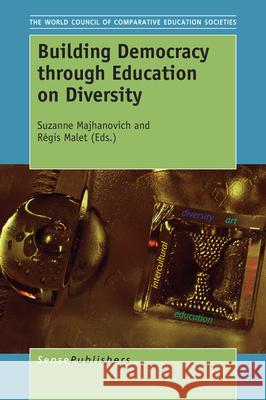Building Democracy through Education on Diversity » książka
Building Democracy through Education on Diversity
ISBN-13: 9789463002578 / Angielski / Miękka / 2015 / 230 str.
Building Democracy through Education on Diversity
ISBN-13: 9789463002578 / Angielski / Miękka / 2015 / 230 str.
(netto: 234,73 VAT: 5%)
Najniższa cena z 30 dni: 236,46
ok. 22 dni roboczych.
Darmowa dostawa!
In our globalized world, the many facets of diversity are ever more in evidence. Issues of race, class, ethnicity, religion, language, gender, sexual orientation and physical disability are manifestations of diversity that have often evoked negative or even violent reactions in society. And yet, any society that deems itself democratic needs to come to terms with diversity in open, informed and accepting ways. Education has an important role to play in developing socially aware, democratic citizens. The ten chapters in this volume contributed by authors from around the world address some of the tensions inherent in a diverse society and provide examples and recommendations for addressing the challenges of diversity in an equitable and democratic way. Three major themes are considered: developing a pedagogy for diversity; issues of gender and race in democratic education; and the transformative role of the arts in democratic education on diversity. The chapters in the collection present case studies, reports and pedagogical approaches supporting education for diversity. While acknowledging problems posed by local customs, neo-colonialism, and neo-liberalism among others to the development of equitable, accessible and democratic education, the authors provide concrete suggestions for an education that will promote intercultural understanding and democratic citizenship.
In our globalized world, the many facets of diversity are ever more in evidence. Issues of race, class, ethnicity, religion, language, gender, sexual orientation and physical disability are manifestations of diversity that have often evoked negative or even violent reactions in society. And yet, any society that deems itself democratic needs to come to terms with diversity in open, informed and accepting ways. Education has an important role to play in developing socially aware, democratic citizens. The ten chapters in this volume contributed by authors from around the world address some of the tensions inherent in a diverse society and provide examples and recommendations for addressing the challenges of diversity in an equitable and democratic way. Three major themes are considered: developing a pedagogy for diversity; issues of gender and race in democratic education; and the transformative role of the arts in democratic education on diversity.The chapters in the collection present case studies, reports and pedagogical approaches supporting education for diversity. While acknowledging problems posed by local customs, neo-colonialism, and neo-liberalism among others to the development of equitable, accessible and democratic education, the authors provide concrete suggestions for an education that will promote intercultural understanding and democratic citizenship.











